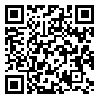دوره 1، شماره 2 - ( 8-1393 )
جلد 1 شماره 2 صفحات 15-12 |
برگشت به فهرست نسخه ها
چکیده: (7062 مشاهده)
Background: Due to their similar routes of transmission, human immunodeficiency virus (HIV) and hepatitis B virus (HBV) co-infection occurs considerably. HBV infection progresses more rapidly in HIV-infected patients. Therefore, HBV vaccination of all non-immune HIV infected patients is recommended. On the other hand, HIV-infected subjects have suboptimal responses to HBV vaccine. In this study, we aimed to determine the immune responses to standard HBV vaccination in HIV-infected patients. Methods: Fifty-six HIV infected patients who lacked evidence of either prior HBV infection or immunity were subjected to standard HBV vaccination, as 3 intramuscular injections of the standard dose (20 μg) of recombinant HBV vaccine at months 0, 1 and 6. Hepatitis B surface antibody (anti-HBs) titers were checked in all cases one month after the vaccination. A protective antibody response was defined as an anti-HBs titer of ≥10 IU/L. Results: HBV seroprotection was observed in 56.6% of HIV-infected patients. There was no significant difference between cases with and without seroprotection regarding age, sex, possible route of HIV acquisition, CD4 count, receiving antiretroviral therapy (and its duration) and HCV infection. Conclusion: Our study confirms previous reports that HIV-infected patients have a lower response rate to the standard HBV vaccination compared to general population. So other strategies are needed to improve the HBV vaccine response rate in HIV cases.
نوع مطالعه: Original article |
دریافت: 1348/10/11
دریافت: 1348/10/11
| بازنشر اطلاعات | |
 |
این مقاله تحت شرایط Creative Commons Attribution-NonCommercial 4.0 International License قابل بازنشر است. |

